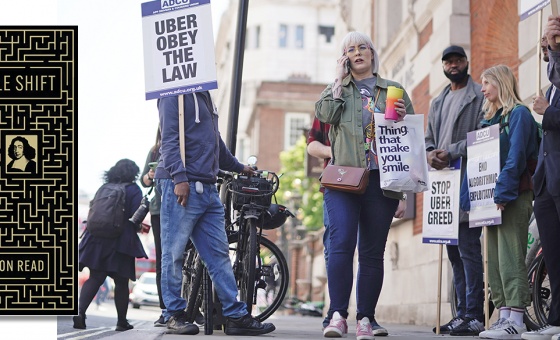This is the last article you can read this month
You can read more article this month
You can read more articles this month
Sorry your limit is up for this month
Reset on:
Please help support the Morning Star by subscribing here
THE swanky black ball gowns glisten in the night at yet another movie awards ceremony. White roses are clutched by actors on the red carpet in a defiant display of sisterhood for those who have been abused. These are the glamorous symbols of the #MeToo campaign.
Highlighting the abuse of women is an excellent cause and award-winning women are right and just to use their fame to publicly denounce directors, fellow actors and all connected with the film industry for raping, shaming and abusing women.
But, when the cameras stop rolling, the ball gowns are discarded and the glitzy awards ceremonies are no longer front-page news, where is the fight for the working-class women and girls out there who do not have a voice or platform to speak out regarding their suffering?
The voiceless are most often the hidden too. Working-class women are in the majority but can be so ordinary, their everyday lives so mundane, that they go unnoticed and thus unheard.
The #MeToo campaign focuses primarily on the physical abuse of women, but there are so many ways in which working-class women are abused that to concentrate on their struggles really does open your eyes to suffering.
Working-class girls are abused from birth by the current Tory government. Born into poverty, their life chances are severely hindered from the minute they are born.
Homelessness, poverty, job instability, foodbank use, family breakdown, single parenthood, divorce, educational opportunities hit working-class parents first and are passed down to the child.
By the time a working-class girl is five years old, she is already behind her middle-class peers educationally.
As a teenager, while middle-class parents are preparing their daughters for university with expensive extra-curricular activities and work placements, working-class girls are struggling to get by. There may be expectations that the girl must be working on completion of school in order to help out with family finances and put bread on the table.
As young women and young mothers, they may be juggling a mundane factory conveyor-belt job or a zero-hours-contract retail job with childcare in order to make ends meet and trying to find a private landlord who accepts the rent on a home that may be wholly or partly paid by universal credit. “No DSS” is pushed in their faces as they are deemed to not be of the class required to rent a property.
Often there may be a disabled child to care for and then the paltry £63pw Carers Allowance is dished out by the DWP like women should be thankful they can claim it at all.
Then middle age may find them caring for elderly relatives, their pensions eroded and having to work several years past retirement as WASPI sufferers, or simply because they cannot afford to retire. All along the way, working class women’s life choices are severely restricted, severely limited. Their lives can be one of drudgery and simply getting by and this can be as good as it gets, as Tory austerity clamps down on women whose shoulders are the beasts of economic burden.
And what of those girls and women where domestic abuse is rife behind closed doors? What of those girls as young as five caring for a relative and juggling school with hardly any support by a slashed social services department? What of those women fleeing war-torn countries, arriving in the UK and being sold into domestic slavery, prostitution or simply being hounded by those who deem it acceptable “to send them all back home” under our broken immigration system? What of those teenage girls being let down in care, and being pimped and trafficked to rapists and abusers in our towns and cities?
These women and girls often have one common denominator — they are working class and therefore voiceless. There is no strong voice who has a constant media platform to raise their cases or highlight their suffering. It’s as if society says these women do not matter and that is utterly abhorrent.
Even when working class women manage to break their chains, they are still often vilified and shunned by an establishment that thinks they have no right to be there. The Labour Party is going through something of a transition seeing Angela Rayner become shadow education secretary after being a single mum at 16 and living on a council estate and the rising star of Laura Pidcock who speaks her mind on issues governing working class lives.
But still working class women in parliament are a tiny minority. They are ridiculed and mocked for their accents, their views. Their past doesn’t fit in with how the establishment wants their MPs to look like and act. Even in our unions and at local Labour branches, there are those who seek to put working class women “back in their box” as they do not have the perceived correct profile of a prospective candidate. I speak from personal experience of this myself as a working class carer of a disabled child. The support and financial backing simply isn’t there and this has to change for working class women to break the glass ceiling.
On International Women’s Day let us be proud of the advances we have made on racial inclusion and of female inclusion in society. But let us be more than painfully aware that, while famous women can wear any number of black ballgowns to highlight the #MeToo campaign, there are working class Cinderellas out here who are not being invited to the ball yet have a whole heap of talent to offer the world and a whole load of suffering that needs to stop.
Their voices and talents must not go unsung any longer. The abuse of the unseen, the voiceless, the broken, the abused, the working class women in our communities must end now or #MeToo is simply an empty soundbite in a moneyed echo chamber.











